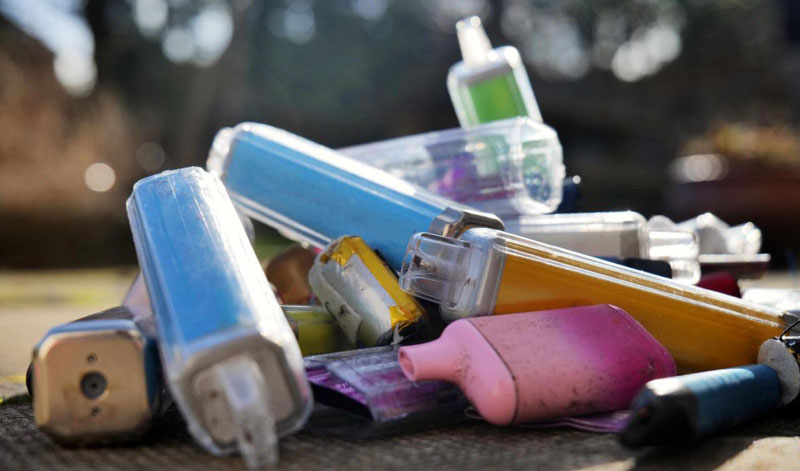
Agnieszka Wyszyńska-Szulc, Vice President, Regulatory Policy, Philip Morris International
It should be noted that when the first package of restrictions was adopted, official imports of vape liquids reached only 20 million lei – no more than a third of the real turnover. In 2022, the excise tax on e-cigarette liquid was set at 1,957 lei per liter. A year later, it rose to 2446.25 lei, and in 2025 it reached 3094.50 lei per liter. At the same time, the threshold of nicotine content was lowered from 72 mg to 20 mg/mL, and the volume of tanks and cartridges was limited to two milliliters. Formally, the state strengthened regulatory and fiscal control. But in practice there was no effect.
Today, the trade in vape products is growing rapidly in the online format, reducing the share in the legal sales channel. According to experts, the products are sold through at least 30 major Internet resources, including Telegram, Instagram and TikTok. State authorities have recognized the situation as critical. Thus, Health Minister Alla Nemerenco stated that in Moldova 12.7% of adolescents aged 13-15 use e-cigarettes. A study of the pediatric community shows that more than a third of the surveyed minors used disposable vapes.
Moldova’s budget lost 650 million lei due to the loss of control over the circulation of e-cigarettes
Data from the State Tax Service confirm the trend. In 2022-2023 alone, more than 1,128 accounts advertising tobacco and nicotine products on the Internet were detected. Despite millions of dollars in fines, most sellers continued the illegal practice.
At the same time, the assortment of vape devices increased in Moldova, many times over. In 2024 alone, the National Agency for Public Health received notifications of 1.3 thousand new types of products – both with and without nicotine. Thus, vapes have come to the forefront of consumption, and this is the main trend of the Moldovan tobacco market.
As Agnieszka Wyszyńska-Szulc, Vice President for Regulatory Policy at Philip Morris International, noted for Logos Press, the situation with e-cigarettes is a difficult challenge for many governments.
“A huge flow of disposable vapes from China has formed in the world, some of which do not meet quality and safety standards, and some of which are illegal. To eliminate this problem, it is very important to enforce the adopted laws. There is no single solution, we need a comprehensive approach – the right fiscal policy, competent regulation of this category of products and joint efforts of different government agencies controlling both points of sale and online sites.
Agnieszka Wyszyńska-Szulc emphasized the importance of artificial intelligence in monitoring sales. For example, in the UK, the government’s Advertising Agency uses AI to monitor online channels to check for advertisements for products that do not comply with the law. That is, there is a solution and the regulator should coordinate efforts to combat illegals. At the same time, it is important to allocate financial resources. In the UK, the authorities have allocated a special fund for law enforcement agencies to control retail outlets. Another example is Denmark. There, a working group of different ministries and agencies was created, which created a common strategy of measures to comply with the law.
The fact that the Moldovan authorities leave no alternative for consumers in their anti-tobacco policy also raises questions. Thus, the Ministry of Health initiated a package of measures aimed at limiting the circulation of tobacco and nicotine-containing products, which centered on a ban on nicotine pouches. The authors of the bill refer to the practice of the European Union, where the circulation of spiders is partially restricted.
Agnieszka Wyszyńska-Szulc emphasizes: there is no centralized ban on nicotine spiders in Europe. “The European Directive leaves it up to national governments to decide on this issue, and most EU countries choose the path of regulation rather than a radical ban. For example, Poland, the Czech Republic, Denmark, Finland, Austria, Romania, Switzerland and Slovakia have brought nicotine pouches into the legal framework by extending to them the same rules as for other smokeless products . These countries have age limits, packaging requirements, nicotine level controls, mandatory labeling and tax burdens.”
There is no centralized ban on nicotine lozenges in Europe
This approach controls the market, reduces the risks of minors accessing nicotine-containing products, generates revenue for the government, and maintains incentives for adult smokers to switch to less harmful alternatives. The ban, on the other hand, pushes this segment into the shadows, where it is impossible to ensure either quality, compliance with age limits, or tax collection.
A striking example is the experience of Belgium, which in 2023 introduced a ban on the sale of spiders. However, an audit conducted in Brussels in 2024 found that there were more than 300 outlets continuing this trade. These products are sourced illegally, often with excess nicotine, without any certification. The state loses control, legal producers are forced out, and the market is taken over by those who operate outside the legal framework. This is a classic example of how excessive prohibitions destroy the system of control and create imaginary protection.

Agnieszka Wyszyńska-Szulc believes that effective tobacco control must be balanced: to encourage smoking cessation, there must be incentives to switch to alternative products. “They cannot be regulated in the same way as cigarettes, otherwise it undermines the whole concept of harm reduction. Japan and New Zealand, two nations that were initially critical of smokeless products, have revised their strategy after analyzing scientific evidence and consumer feedback. Instead of bans, they introduced control mechanisms, emphasized harm reduction, and developed public education campaigns. As a result, these countries have seen a decline in smoking rates and improved public health outcomes.”
The key element, according to the expert, should not be confrontation with the consumer, but working with him. “Public policy should be built around the individual. Give him a choice. Provide protection. Show the difference. This is the only way to achieve real results – both in health care and in the economy,” she notes.
Today, Moldova is the only country in Europe and one of the six countries in the world where tobacco consumption is projected to increase. The World Health Organization Global Report estimates that by 2025, the prevalence of tobacco use will reach 27.1% for both sexes, starting from the age of 15.
Moldova is at a crossroads in its anti-tobacco policy. On the one hand, there is a desire to follow the European vector and demonstrate determination in the fight against smoking. On the other hand, there are risks of rejecting the EU’s cutting-edge approaches, ignoring scientific evidence and falling into the trap of populist measures that may have a short-term political effect but cause long-term damage. To keep pace with advanced countries, Moldova needs to move away from rigid bans in favor of flexible, science-based regulatory policies.
Working with consumers rather than confronting them should be the key element.
Among the measures that could ensure the effectiveness of the national strategy, Vyszynska-Schultz suggests strengthening control over online commerce, implementing a monitoring system through interagency groups, differentiated regulation depending on the product category, and investing in public education campaigns. She notes the successful experience of the United States, where targeted programs are in place to control sales to minors, monitor points of sale and develop educational initiatives.
Against the backdrop of the upcoming elections and changing political configurations, the transition to a well-considered, balanced model of tobacco market regulation seems particularly urgent. This is an opportunity for the state to prove that the European path is not a slogan, but a real and consistent choice in favor of common sense, national health and sustainable development. Otherwise, bans disguised as care may turn out to be another failure, for which society will pay again.

